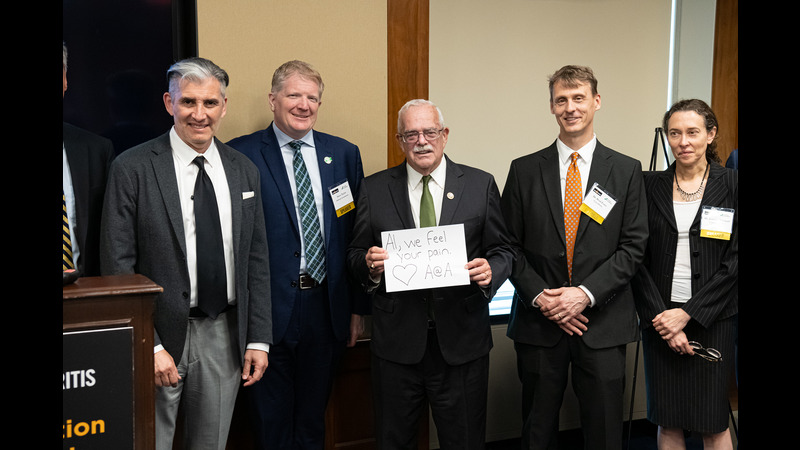
Angry@Arthritis, the recently launched nonprofit that is seeking cures for OsteoArthritis (OA), in partnership with the Arthritis Foundation kicked off its first “Shark Tank” session on Capitol Hill today to present the science behind the promising cures in the pipeline, and issued a call for more Federal government action to find cures more quickly.
Steve O’Keeffe, who created Angry@Arthritis this year to pursue cures and to provide fellow patients with a better guide to the disease than when he was diagnosed 18 months ago, pledged to stay in the fight for the long haul.
“I’m not going anywhere until this problem is solved,” said O’Keeffe, who is also the founder of MeriTalk.
“With Angry@Arthritis, we are very focused on changing the failing status quo” on arthritis treatment to find promising cures, rather than the current lineup of treatment that runs the gamut from pain management to joint replacements, he said. “We need other solutions,” he said, “I am going to try to cure it and solve it.”
Steve Taylor, CEO of the Arthritis Foundation, hailed the partnership effort with Angry@Arthritis at today’s kick-off in the Rayburn House Office Building in Washington, D.C., and emphasized that the foundation mission is about “finding better cures” along with creating better treatment options. Taylor said the foundation will spend $12.2 million this year to fund research into all forms of arthritis – with about half of that pegged to OA research efforts.
Support in Congress
Rep. Gerry Connolly, D-Va., himself a long-time arthritis sufferer, said today that an estimated 70 million Americans have some form of arthritis, and that 32.5 million of them have OA.
He said the disease is “so common that you would think it would be among the highest priorities given how common it is and how debilitating it is.”
Speaking of his colleagues in the House of Representatives, Rep. Connolly said, “I work in a place where I don’t think a week goes by where I don’t talk to a colleague who had a hip replacement, or a knee replacement, and it’s all arthritic based. And that’s just one little institution with 430 people.”
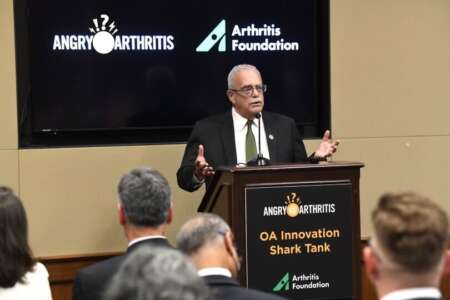
“I’m glad that the Biden administration has asked for $688 million dollars for the National Institute of Arthritis and Musculoskeletal and Skin Diseases (NIAMS), and I’m sure we can do more,” the congressman said. “This does seem to me this is one of those human conditions we’ve got to address … with new technology and new genetic frontiers that give us the opportunity to address it in a way that goes far beyond extra Tylenol.”
“Keep up this fight because I think it’s really important, and it has the potential for really alleviating a lot of human suffering,” the congressman said.
Policy Inputs
Further on the Federal policy front, Angry@Arthritis called on Congress today to “fully fund arthritis research and programs to better reflect the disease burden.”
“Many research and clinical experts across America and the world have treatments and potential cures in human clinical trials,” the group said. “We need strong Federal investment to support this promise and bring cures to Americans and the world.”
Among other steps, the group called for Congress to:
- Commission a Government Accountability Office (GAO) report that audits, aggregates, and evaluates arthritis research funding across all Federal agencies, and require an annual OA Progress Update and Outcomes Report to show progress toward cures;
- Boost funding for the CDC Arthritis Program to $60 million;
- Create a dedicated $20 million arthritis research program at the Defense Department; and
- Increase funding dedicated to arthritis research at the National Institutes of Health (NIH), including at NIAMS.
Four Global Doctors Offer OA Innovations
A slew of doctors from around the world joined Angry@Arthritis today to spotlight the promise of new treatments and cures.
Dr. Brad Estes, founder and CEO of CytexOrtho, is leveraging 3D printing to create a cutting-edge regenerative medical implant designed to mimic native tissues that help to restore damaged joints in a patient’s hip. Average hip replacements, Estes said, are not appropriate options for young and healthy victims of OA.
“There’s a lot of benign neglect when something comes to the joint space, because there’s nothing that can be done inside the joint space, particularly for hip patients,” Dr. Estes said. “That’s really what’s motivated us from the beginning, is how can we provide care for this patient has been largely ignored?”

“Hip replacements are rising, and they’re rising in the younger patient population,” Dr. Estes said. “Something needs to be done about that, and I’m hopeful for this group, and others like us, that we can do something to start treating this patient and offering a better solution.”
CytexOrtho’s “ReNew Hip” is a solution for the active patient, allowing them full mobility in just two to three months after the surgery. The Durham, N.C.-based medical device company is set to begin human clinical trials in fall of this year.
The Chair of the Biomedicine Department at the University of Basel, Dr. Ivan Martin, has spent the last decade working on treatments in the knees, ankles, and shoulders for OA patients. Dr. Martin’s work focuses on Nasal Tissue Engineered Cartilage treatment that harvests cells from nasal cartilage and engineers them into cartilage patches in a lab, which are them surgically inserted into damaged OA joints.
“It looks like cartilage; it feels like cartilage; the composition, the mechanical properties approach those of native cartilage, and most importantly, it’s alive,” Dr. Martin said. “It’s a living piece of cartilage because it is made out of a patient’s own cells – which are taken from the cartilage from the nose.”
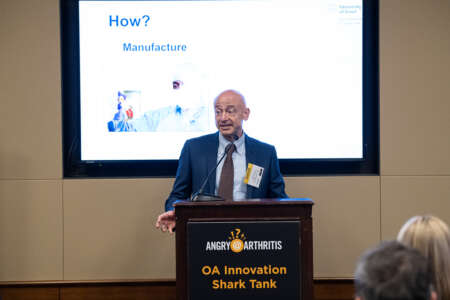
“This piece of cartilage is intended to target those individuals who have confined focal lesions that would otherwise spontaneously degenerate into osteoarthritis,” Dr. Martin explain. “I feel an obligation as a scientist towards these patients. The first thing is the commitment to bring this strategy to the most advanced possible stage so that as many patients as possible can make fruition of this new technology.”
The Switzerland-based team’s work is not yet available in the United States, but over the last decade they’ve treated over 100 human patients with focal cartilage defects in the knee and most recently they have moved to treat patients with full OA in knees, ankles, shoulders, and next year, elbows.
Johns Hopkins University Translational Tissue Engineering Center Director Dr. Jennifer Elisseeff is currently pioneering regenerative immunology – treatments that empower patients’ bodies to repair their joints themselves.
“When I think now of joint health … you need the tissue, you need the bones of that building to hold the tissue together, but you also need to think of the environment where it’s going,” Dr. Elisseeff explained. “Is it a healthy environment? Is it going to support growth? And then think of the whole system – we need to think of it more holistically.”
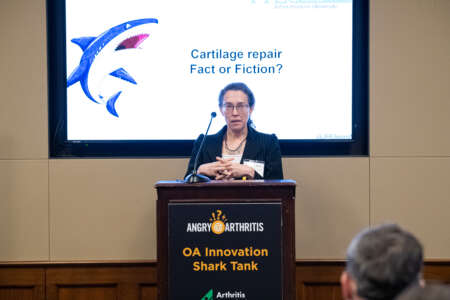
She said that it’s critical to address the environment where the inflammation is happening, calling for a need of combination therapies. She created the original recipe for the senolytic drug UBX0101 – a treatment specifically for OA – that showed great promise, but ultimately failed in the Food and Drug Administration (FDA) clinical trials.
Finally, the Angry@Arthritis Shark Tank Innovation event featured work from Dr. Yusuf Yazici, BioSplice Therapeutics’ chief medical officer. Dr. Yazici’s work focuses on OA in the knee, and his organization’s product – lorecivivint – is currently in phase three of clinical trials.
Lorecivivint is an injectable inhibitor thought to modulate inflammatory pathways and aiming to be presented as a pain and disease-modifying treatment. Over the last decade, Dr. Yazici’s team has been able to prove that their injection improves pain and function of the joint in OA patients.
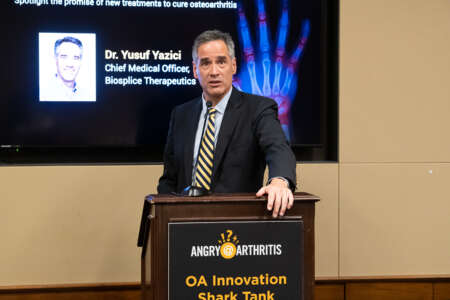
“Rheumatoid arthritis now has 14 drugs that have been approved for disease modifying properties, and they have a tenth of the patients that we have,” Dr. Yazici explained. “Every approach that we can get to we need to be investing in. This is a huge problem for current numbers, but also will be getting worse over time.”
BioSplice Therapeutics expects their lorecivivint treatment to be offered for FDA approval this summer, and if approved, to become available for OA patients by the latter half of 2025.
